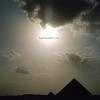Sam Shalabi, "Eid"
 The looming silhouettes of the pyramids on the cover give some idea of what to expect on Sam Shalabi's latest release. Born in Egypt and finished in Canada, Eid is an eclectic and ecstatic album. Each track sounds like it was pulled from a local radio station in Cairo yet no two pieces sound like they came from the same station. Shalabi fuses Western and Arabic music without straying into trite, watered-down fusion territories.
The looming silhouettes of the pyramids on the cover give some idea of what to expect on Sam Shalabi's latest release. Born in Egypt and finished in Canada, Eid is an eclectic and ecstatic album. Each track sounds like it was pulled from a local radio station in Cairo yet no two pieces sound like they came from the same station. Shalabi fuses Western and Arabic music without straying into trite, watered-down fusion territories.
Given the recent explosion in interest in Arabic, African and Middle Eastern music thanks to labels like Sublime Frequencies and the almost rabid reissue schedule of '70s Turkish psychedelica, it is hard to not compare Shalabi to these seemingly never ending scores of artists. I must admit, he compares quite favourably as he hits a lot of buttons that a lot of these other releases do not. Firstly, the quality of the recording is obviously far superior and secondly, the druggy nature of the music captures my ear to a far stronger degree than many of the Turkish bands that have been unearthed in recent years.
"Jessica Simpson" takes the white hot guitar playing of Jimi Hendrix and White Light/White Heat era Lou Reed and transposes it to another continent. (Take the quotation marks out of that sentence and you get a dizzying thought.) I do not know if Shalabi himself plays this solo, as there is a list as long as my arm of performers in the sleeve notes, but whoever is hitting those guitar strings knows what they are doing. This is followed by "Eid," a very different piece altogether. Repetitive melodies go in and out of sync with each other, stringed instruments sounding like they are bending space around them. The effect is mesmerising on a number of levels.
Unfortunately, the album dips in quality with a couple of somewhat pedestrian pieces. In fairness, anything coming after that title track is always going to come off worse. However, it is not all downhill as Shalabi brings things back on track with "Billy the Kid." Elizabeth Anka Vajajick's vocals sound strong but in danger of falling apart, like there is only so much emotion that can be forced through a human throat.
Overall, Eid is a patchy but frequently brilliant album. When it is good, it burns like an immense bonfire and at its weakest it at least still gives off enough light and heat to keep the listener close. Its huge cast of players (over 30 contributors) is both its greatest asset and its downfall; dozens of styles and instruments are used but even if this approach works, it causes the album to stumble from time to time. Still, it is difficult to let these faults mar the better points of Eid. On the strength of its best tracks, this album is well worth investigating, even if it is a track by track dissection from an online download vendor.
samples:



